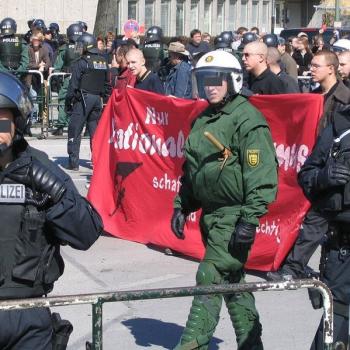Look, I’ll be honest with you: when I first read about the bombings in Brussels (link to CNN for convenience), my immediate reaction was not concern for the victims, but, instead, concern for our own vacation this summer. We’ve got it all planned out now, you see. Are the places we’re visiting likely terrorist targets? London, the Netherlands (a spot halfway between Amsterdam and Rotterdam, by the coast), the Moselle Valley, Augsburg, and Munich. They’re all safe, right?
At least 26 dead, and 130 wounded in 3 separate attacks, with two blasts at the airport, at about 8 am local time, and another an hour later at the Maalbeek subway station. Why that station? It’s in the city center, and just 400 yards from the EU headquarters, according to the Daily Mail (Drudge link). It’s not clear to me from the reporting if these were suicide bombs or, well, just bombs.
But after the Charlie Hebdo attacks, and the Bataclan attacks (see here for a brief timeline), and especially because of the revelations during the course of that news coverage of Belgian links, today’s attack feels inevitable. And what’s also surely inevitable is the coming debate: Is this ISIS-fueled, and another reason the West needs to more forcefully intervene in Syria and Iraq? Or is this the fault of the Belgians and French themselves, for having failed for decades to integrate their Muslim immigrant communities? — the latter explanation being the favorite way Americans like to tell themselves that we in the United States aren’t at risk because we’ve been nice to our Muslims. But “being nice to our Muslims” didn’t keep the victims in San Bernadino safe, did it?
There’s an ongoing theme among some in American politics and punditry that we shouldn’t worry excessively about terrorism. Sure, there have been scattered attacks, some dramatic, such as the Santa Barbara attacks, and some barely reported, such as various “lone wolf” attacks on individuals. But any given individual’s risk of dying from a terrorist attack is pretty dang low, so it shouldn’t be a cause for concern, or change much about the way we go about our business, or how the administration manages international affairs. Here’s a New York Times analysis piece from just before the State of the Union, “Balancing Terror and Reality in State of the Union Address“:
Here is what he probably will not say, at least not this bluntly: Americans are more likely to die in a car crash, drown in a bathtub or be struck by lightning than be killed by a terrorist. The news media is complicit in inflating the sense of danger. The Islamic State does not pose an existential threat to the United States.
He will presumably not say this, either: Given how hard it is for intelligence and law enforcement agencies to detect people who have become radicalized, like those who opened fire at a holiday party in San Bernardino, Calif., a certain number of relatively low-level terrorist attacks may be inevitable, and Americans may have to learn to adapt the way Israel has.
By all accounts, Mr. Obama is sympathetic to this view, which is shared by a number of counterterrorism veterans who contend that anxiety has warped the American public’s perspective.
But the idea that “more people are killed by X than by terrorism” misses the point of terrorism — the very objective of which is to terrorize people, due to the public nature of the attacks, and the fear that you could be next. And I don’t think the residents of Brussels are telling themselves, “hey, all in all, no big deal.”










